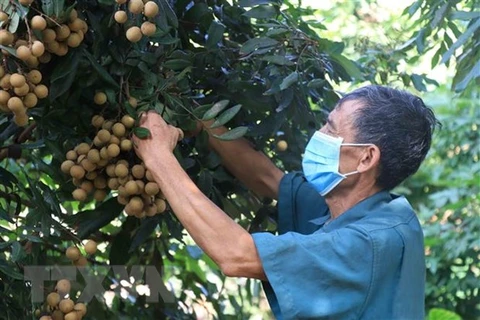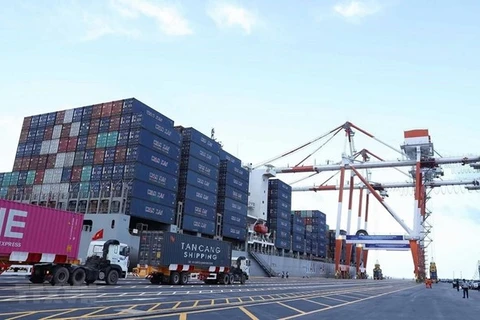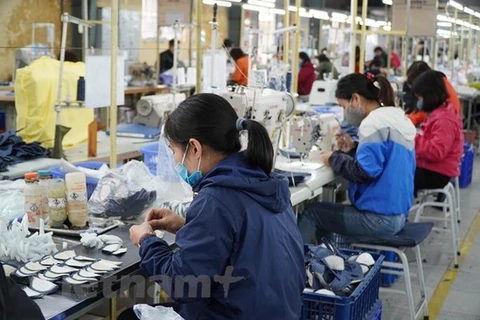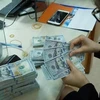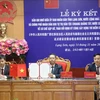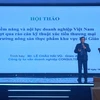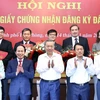London (VNA) - Vietnamese agricultural product exporters that want to establish long-term business relationship with the UK need to have appropriate strategies, and approach potential partners in order to take advantage of export opportunities to this important market – the second biggest economy in Europe, advised Nguyen Canh Cuong, Vietnamese Trade Counselor in the UK, at a recent consulting webinar.
The event was jointly organized by the Vietnam Trade Office in the UK and the Trade Promotion Agency under the Vietnamese Ministry of Industry and Trade with the participation of more than 100 delegates who are representatives of agencies, organisations and enterprises exporting Vietnamese agricultural products.
According to Cuong, the UK - Vietnam Free Trade Agreement (UKVFTA), which became effect on May 1, along with British businesses' need to find suppliers outside the European Union after Brexit have created competitive advantages for many Vietnamese agricultural products in the UK market as well as more room and opportunities for cooperation between the two sides.
In 2020, Vietnam exported more than 16,000 tonnes of cashew nuts worth over 92 million USD to the UK, accounting for 71 percent of the market share. It also shipped 5,620 tonnes of pepper and 27,915 tonnes of coffee to the European country, accounting for nearly 40 percent and 5 percent of the market share.
However, other agricultural products such as rice and fruits are only available in small supermarkets and have not gained access to big supermarkets in the country. This shows that there remains huge potential for Vietnamese farm produce and vegetables to enter the UK market, Cuong stated.
Stressing the market’s high requirements on product quality, he suggested businesses adopt GlobalGAP standards as this is one of the prerequisites for Vietnamese agricultural products to be able to access high-end markets.
Sharing the same view, Nguyen Huy, a representative of Eurofins Assurance Vietnam Group, and Doctor of Agriculture Han Van Hanh, a post-graduate at Glasgow University, said that GlobalGAP will help Vietnamese businesses develop sustainably and stand firm at foreign markets.
In addition, for potential products such as tea, spices and fruits, Vietnamese businesses need to win trust of British buyers before they can sell goods, they added./.
The event was jointly organized by the Vietnam Trade Office in the UK and the Trade Promotion Agency under the Vietnamese Ministry of Industry and Trade with the participation of more than 100 delegates who are representatives of agencies, organisations and enterprises exporting Vietnamese agricultural products.
According to Cuong, the UK - Vietnam Free Trade Agreement (UKVFTA), which became effect on May 1, along with British businesses' need to find suppliers outside the European Union after Brexit have created competitive advantages for many Vietnamese agricultural products in the UK market as well as more room and opportunities for cooperation between the two sides.
In 2020, Vietnam exported more than 16,000 tonnes of cashew nuts worth over 92 million USD to the UK, accounting for 71 percent of the market share. It also shipped 5,620 tonnes of pepper and 27,915 tonnes of coffee to the European country, accounting for nearly 40 percent and 5 percent of the market share.
However, other agricultural products such as rice and fruits are only available in small supermarkets and have not gained access to big supermarkets in the country. This shows that there remains huge potential for Vietnamese farm produce and vegetables to enter the UK market, Cuong stated.
Stressing the market’s high requirements on product quality, he suggested businesses adopt GlobalGAP standards as this is one of the prerequisites for Vietnamese agricultural products to be able to access high-end markets.
Sharing the same view, Nguyen Huy, a representative of Eurofins Assurance Vietnam Group, and Doctor of Agriculture Han Van Hanh, a post-graduate at Glasgow University, said that GlobalGAP will help Vietnamese businesses develop sustainably and stand firm at foreign markets.
In addition, for potential products such as tea, spices and fruits, Vietnamese businesses need to win trust of British buyers before they can sell goods, they added./.
VNA



